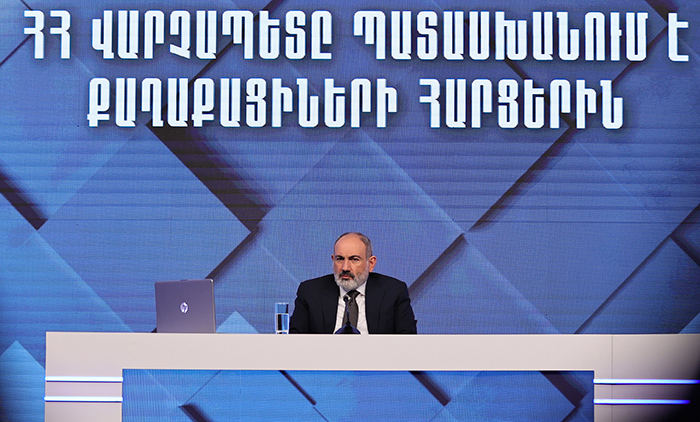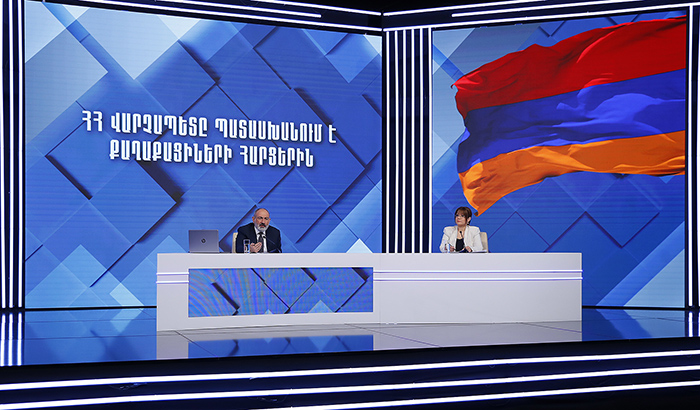[ad_1]
YEREVAN — Armenian Prime Minister Nikol Pashinyan has said any decision about Yerevan’s continued membership in the Russian-led Collective Security Treaty Organization (CSTO) will be based on “its own state interests” after he declined to attend the current summit in Minsk.
During a live question-and-answer TV program with the public on November 24, Pashinyan also said the country was looking for options to reduce its outstanding financial debt to Russia by several means, including using the payments it has made for weapons that Moscow has failed to deliver.
“We will focus on the state interests of Armenia, and if we have or haven’t made any decision at this moment, our benchmark is the state interests of Armenia,” Pashinyan said during an almost nine-hour-long broadcast when asked by a caller why Yerevan remained a member of the CSTO defense bloc.
“At the moment, our records show that the CSTO’s de facto actions or inaction do not address its obligations toward the Republic of Armenia, that is, in this sense, the CSTO’s actions are not in line with Armenia’s interests. And we raise this issue in a transparent way,” Pashinyan added.
A caller also asked Pashinyan why his government wasn’t considering the reversal of a controversial deal that Russia made with Yerevan in the early 2000s to take possession of some of Armenia’s lucrative strategic assets in exchange for the South Caucasus country’s debt.
Pashinyan said Armenia was looking at several options to reduce its debt to Russia, including the use of payments it has made for weapons that Moscow has failed to deliver.
The Armenian prime minister gave no figures, but again confirmed that there were problems with Russia fulfilling its arms contracts with Armenia.
He said reducing Armenia’s debt to Russia could be one of the mechanisms of settling the issue, but that there were other options as well.
“We know that Russia itself needs weapons. In this context, we expect to settle this issue in a routine working manner. I hope that our discussions will lead to concrete results,” Pashinyan said.
Azerbaijan Still Vague on Commitment to Peace
PM Pashinyan said that it still remains unclear whether Azerbaijan will ultimately commit to signing a peace agreement with Armenia based on the three principles that he said were agreed upon during negotiations mediated by the European Union.
Answering questions sent in by the public during a live TV broadcast, Pashinyan referred to his meetings with Azerbaijani President Ilham Aliyev that were held with the mediation of European Council President Charles Michel in May and July.
The Armenian premier reiterated the three principles, including mutual recognition of territorial integrity and borders, border delimitation based on a 1991 declaration signed by a dozen former Soviet republics, including Armenia and Azerbaijan, after the collapse of the USSR, and the sovereign jurisdictions of the states over transportation links passing through their territories.
“Now we cannot say with certainty that Azerbaijan refuses to sign a peace agreement based on these three principles, but we cannot say with certainty that Azerbaijan reaffirms its commitment to these three principles either. There is a need to clarify these issues and nuances during the negotiations,” Pashinian.
Pashinian reaffirmed that a meeting of the two countries’ officials engaged in border delimitation and demarcation activities will be held at a yet undisclosed location along the state frontier on November 30.
He said that Yerevan will draw conclusions from those discussions as to whether “Azerbaijan is ready for peace based on those principles or whether Azerbaijan rejects those principles.”
“We don’t have that confidence until today,” Pashinyan said.


Large-scale Reforms Underway in Armenian Armed Forces
Large-scale reforms are underway in the Armenian Armed Forces, Prime Minister Nikol Pashinyan said on Friday, answering citizens’ questions in a live TV broadcast
He said one of the reforms is raising military personnel salaries through certification. One of the citizens asked why the model of developed countries, such as Switzerland, is not applied in the Armenian army.
In response, Pashinyan said that the reforms are being implemented taking into account the international experience.
He recalled the recently the government introduced 24-day training camps, one of the goals of which is to follow the Swiss model. Under this model, reservists periodically participate in 24-day training camps aimed at learning minimum military skills.
Pashinyan Emphasizes Importance of Syunik Region for Economic Development
Pashinyan stressed the importance of the southern province of Syunik in the context of the country’s economic development.
‘I am convinced that the only thing that can ensure 100% peace is a lasting, de jure fixed binding peace. And that is what we want to get,” he said.
“Syunik region is one of the most economically active parts of the country today as a substantial part of our imports and exports goes through the Meghri checkpoint,” Pashinyan said.
‘The Crossroads of Peace project, developed by our government, among other things, shows our vision of how Armenia’s transportation systems should develop, which is directly linked to Meghri,” he stressed.
The Prime Minister believes that a railroad should pass through Meghri, which will connect the West with the East, including Azerbaijan with its exclave Nakhchivan, Armenian Meghri with Yeraskh and the rest of Armenia, and Armenia with the international railroad network.
Agricultural Lands Should be Consolidated to Attract Investments
PM Pashinyan said in order to attract investments for the agriculture it is necessary to consolidate the fragmented land plots.
“Land fragmentation appears to be the most serious problem for the development of agriculture and attraction of investments. All calculations show that in order to have efficient agriculture, it is necessary to possess and cultivate larger land plots. But today, as a result of privatization, our lands are divided into small parcels,” Pashinyan said in an online questions and answers session with the citizens.
Pashinyan noted that investors want to make large investments but are unable to do so because there are practically no land plots large enough in the country. When trying to buy a few small plots from individuals, another problem arises: the plots have a large number of owners, some of whom are not in the country and some others have already passed away.
“Right now we are running a pilot program to consolidate land plots, trying to work with our villagers to get them to lease their land to large investors, or help with the sale of plots,” he said.
Pashinyan Calls for Speeding Up Procedure for Nagorno-Karabakh Refugees to Obtain Citizenship
PM Pashinyan clarified the meaning behind granting Nagorno- Karabakh an interim status, and touched upon the thesis of some opposition circles that the Russian Federation is punishing the Armenian authorities for certain actions starting with the 44-Day War.
It is necessary to speed up the procedure for refugees from Nagorno-Karabakh to obtain citizenship, Pashinyan said.
“Particularly for those who want to join the civil service,” the prime minister said when asked about the bureaucratic delays refugees face when trying to get a job.
Pashinyan noted that he instructed the relevant bodies to speed up the procedure as much as possible.
“Those residents of Nagorno-Karabakh who have already applied for employment can be given special treatment,” the prime minister said.
On the Russian Federation punishing Armenia. “First of all, I would not like to make the Russian Federation a subject of discussion in this context, but let’s discuss this thesis seriously.
In that case, who punished whom and for what during the Four-Day War of 2016? The circulated thesis implies that there was a revolution, the revolution was not desirable for our partners, as if this government was pro-Western, and that’s why it was punished.
“In this case what was the purpose of the Four-Day War in 2016? What can be said about the events of 2013 when Armenia engaged in negotiations to sign the Association Agreement with the Western world but canceled the decision overnight, instead becoming a member of the Eurasian Economic Union? Furthermore, why did Russia sign a multibillion-dollar arms contract with Azerbaijan in 2011?”
I haven’t said everything about Karabakh. A lot can be said about the Karabakh issue. What was Serzh Sargsyan’s statement about in April 2018? What was he referring to when he expressed that, for a considerable period, there was little hope that Azerbaijan would abandon its military approach to resolving the Karabakh issue, and the negotiation process had reached a deadlock?” Pashinyan inquired.
The Prime Minister has provided some details about the negotiation situation related to the Nagorno- Karabakh issue as of 2018.
[ad_2]
Source link










